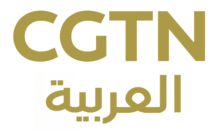CGTN Arabic
 Logo of the channel starting 2017. | |
| Type | State media |
|---|---|
| Country | China |
| Broadcast area | Worldwide |
| Headquarters | Beijing, China |
| Programming | |
| Language(s) | Arabic |
| Picture format | HDTV 1080i |
| Ownership | |
| Owner | China Global Television Network (subsidiary of China Central Television) |
| Sister channels | |
| History | |
| Launched | July 25, 2009 |
| Former names | CCTV-Arabic (2009–2016) |
| Links | |
| Website | arabic |
| Availability | |
| Streaming media | |
| CNTV Ai Bugu (China) | arabic |
CGTN Arabic (Template:Lang-ar), formerly CCTV-Arabic (Template:Lang-ar), is an Arabic language television channel owned by China Global Television Network, a subsidiary of China Central Television.
History
On July 25, 2009, CCTV launched its Arabic-language international channel, stating that it aimed to maintain stronger links with Arabic nations and that the new channel will "serve as an important bridge to strengthen communication and understanding between China and Arab countries".[1] CCTV also had plans for a Russian-language channel, which launched later in the year.[2] The free-to-air channel was open for view to an audience of potentially 300 million in 22 countries, through the use of satellite television.[2]
Development and funding
The South China Morning Post reported that CCTV was prepared to spend 45 billion yuan (US$9.5 billion) into the development of the channel, a claim unconfirmed by official sources.[2]
Content
The channel broadcasts entirely in Arabic, with programs from the four categories of news, feature stories, entertainment and education. Each program is broadcast six times per day, while news reports are regularly updated. The channel will gradually increase the number of programs as it develops.[1]
See also
- CCTV-4 (Chinese)
- CGTN Русский
- CGTN Français
- CGTN Español
- CGTN (TV channel)
- China Network Television (CNTV)
References
- ^ a b CCTV launches Arabic international channel - CCTV.com
- ^ a b c CCTV launches Arabic channel Archived 2009-10-01 at the Wayback Machine - asiaone News
External links
- Official website
 (in Arabic)
(in Arabic)
